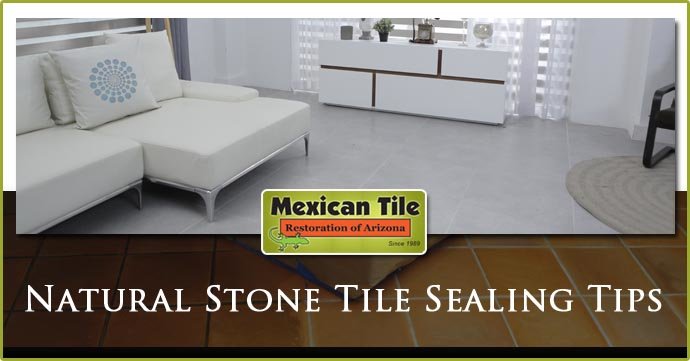If you’re searching for Natural Stone Sealer or how to seal natural tile this post will help! Natural tile is a beautiful flooring that’s install in some of the finest houses and properties all across Arizona. Keeping the proper type of sealer on it is part of maintaining it’s value.
How To Seal Natural Tile
There are several factors that will need to be considered before you are able to determine if the natural stone should be sealed:
- What type of maintenance has the stone gone through?
- Where is the stone located (such as bathroom, foyer, floor, wall, countertop, etc.)? Is it commercial or residential?
- If resin has been applied to the stone, how will the sealant react to the resin?
- Will the sealant affect the aesthetics or color of the natural stone?
- What type of finish was applied to the surface of the stone? For instance, a polished surface will be more resistant to staining then honed surfaces.
- Is the stone expected to be in constant contact with any type of staining agents?
- How porous is the stone and just how fast can it absorb liquids (which is also called the absorption coefficient)?
- What is the durability, hardness and density of the natural stone?
The location, type of stone, how its maintained and its finish will need to be considered whenever you are determining on how to protect the stone.
Which Natural Tile Floors Should Be Sealed
There are some cases where it just makes sense to seal the stone. Once the stone has been properly sealed, the stone will be protected against everyday spills and dirt. In other cases, it is better to leave the stone untreated. Topical sealers can actually change the finish and surface texture as well as cause build up on the surface, which creates a layer that isn’t as durable as the stone. Normally, topical sealers are not recommended for exterior stone because it can trap in moisture within the layers of the stone, which can cause surface deterioration during freeze and thaw cycles.
According to the Marble Institute of America, there are benefits that a sealer can provider in certain applications. It is recommended that care is used in the application of any type of chemical to the surface of a stone. However, even though they are not harsh, there are some sealers that may react with maintenance or cleaning chemicals and/or any components that is in the surface of the stone, which can cause reactions.
Types Of Natural Stone Tile Sealers
If you have decided that you want to treat your stone, then you will want to ensure that you are understanding the differences that are between the different types of sealers that are on the market right now:
- Impregnators will be solvent, or water based solutions that can penetrate under the surface layer and become a repellent. They are often hydrophobic or water repelling but there are some that are oliophobic or oil repelling. Often times impregnators can keep the contaminants out of the stone, but it doesn’t stop any interior moisture in the stone from escaping. These types of products are considered to be breathable, which mean there is vapor transmission. Food preparation areas and vanity tops may need to have impregnators applied. Check with a professional installer for any recommendations. If you apply an impregnator, then you want to be sure that it will be safe for use on food preparation areas. If you have questions, then check with the manufacturer.
- Topical sealers are a type of coating that was designed to protect the stone surface against oil, water and other contaminants. They are made from acrylic, natural wax as well as other plastic compounds. Whenever a topical sealer has been applied, the maintenance program will shift from a program for the stone to one for the maintenance of the sealer. (for instance – stripping the sealer and reapplying it.)
Before you seal your natural stone, always:
- Ask yourself if the stone needs to be treated to start with?
- Read any manufacturer instructions and warranty
- Considered the life span of the application such as 1 – 2 – or 5 years, etc. Keep a log of each application.
- Contact the manufacturer before you apply the sealer if you need clarification or if you are unsure. The same concept for woodworking of measure twice, cut once can be applied here.
- Consult a professional if it is needed.
- Never switch from one product to another without completely understanding any type of potential issue. Not all products will be alike. If you are unsure, then contact the manufacturer or a professional.
Phoenix Natural Stone Sealing Service
If you’d like the professional touch for natural stone tile sealing or maintenance our team can help! Mexican Tile Restoration serves the Phoenix Valley with the best tile restoration, tile sealing, and all tile maintenance projects. We understand how to clean, seal, and ensure the life of your tile flooring to preserve the value of your property.
Call 602-370-6082 to ask a question or schedule your service today!
